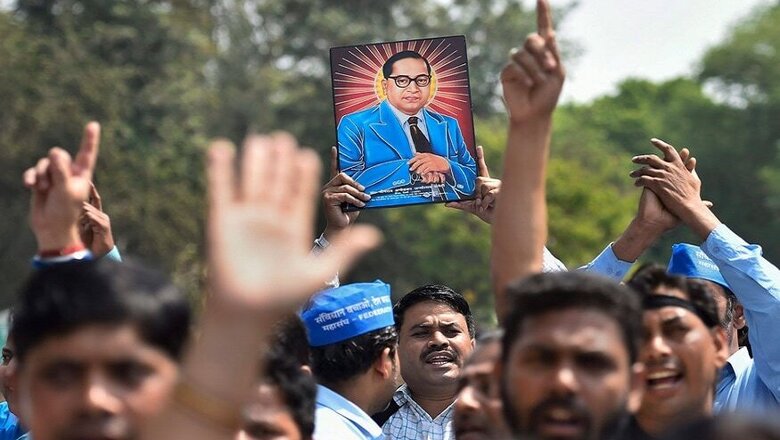
views
Southern trees bear a strange fruit, Blood on the leaves and blood at the root, Black bodies swingin' in the Southern breeze, Strange fruit hangin' from the poplar trees...
Here is a fruit for the crows to pluck, For the rain to gather, for the wind to suck, For the sun to rot, for the tree to drop, Here is a strange and bitter crop
Like Abel Meeropol's landmark song on the lynchings of Blacks in America, there is a strange and bitter fruit swaying in the wind in Maharashtra.
On May 27, or two days after the killing of George Floyd at Minneapolis in the United States by a white police officer, a young Dalit activist Arvind Bansod died in suspicious circumstances at Nagpur.
Bansod was rushed to hospital, but died during treatment. A leader of the ruling Nationalist Congress Party (NCP) has been booked for alleged abetment of suicide in the incident, which occurred in the constituency of state home minister and NCP leader Anil Deshmukh.
On June 7, Viraj Jagtap, a Dalit youth and self-made entrepreneur, was murdered at Pimpri-Chinchwad near Pune by upper-caste assailants in an alleged case of honour killing.
Bansod and Jagtap can be called Maharashtra’s own George Floyds—the victims of a regressive system that discriminates and bestows privilege based on an accident of birth. However, unlike Floyd’s murder, which led to protests across the United States, the reaction to these killings has been largely muted in Maharashtra sans some battles on social media.
Though one reason for the lack of any grassroots assertion is the ongoing lockdown and spread of coronavirus, this can also be attributed to the larger retreat of the Dalit-Bahujan and progressive movements, ironically in the state which birthed them.
While Mahatma Jotiba and Savitribai Phule birthed the anti-caste movement and an indigenous form of feminist thought, Dr Babasaheb Ambedkar and Chatrapati Shahu of Kolhapur have been icons for social reform movements.
Maharashtra also saw the emergence of the Dalit Panthers, which was an organization of educated Dalit youth brimming with anti-establishment rage that birthed an avant garde genre of literature and catalysed similar movements across India. Bahujan Samaj Party (BSP) founder Kanshiram also began his activism in Maharashtra.
The reasons for this drift are manifold.
For one, mainstream Dalit leaders and their parties have been either politically run into the ground or co-opted by political parties, leading to a dilution of conviction and purpose.
For instance, former Dalit Panther activist Ramdas Athavale is now firmly with erstwhile ideological foe, the Bharatiya Janata Party (BJP), and is a union minister of state. Other leaders of the Republican Party of India (RPI) factions like Jogendra Kawade, and Rajendra Gavai are aligned with either the Congress or the NCP.
Dr Babasaheb Ambedkar’s grandson Prakash Ambedkar, who had emerged as a potent political force after the Lok Sabha elections last year, has seen his Vanchit Bahujan Aghadi (VBA) being reduced to a pale shadow of its former self.
This ensures that the simmering rage in the Dalit community against such incidents is not vented out in an organised, mainstream route.
In a system where strength lies in numbers, a legacy issue confronting the Dalit movement is the lack of a larger socio-political alliance with other marginalised groups. The RPI is staffed largely by leaders and cadre from the Neo-Buddhist community, which is seen as the most militant among the Scheduled Castes (SC) in Maharashtra.
These RPI factions and leaders have been unable to form a rainbow coalition with other Dalit castes and subalterns like tribals and nomadic and de-notified communities.
Hence, non-Neo Buddhist Dalit communities like the Matangs, Charmakars and Holars, are now part of other political formations like the Congress and the Shiv Sena.
The VBA, which was formed in the aftermath of the attacks on Dalits visiting the Bhima-Koregaon war memorial near Pune on January 1, 2018, and a counter-protest called by Prakash Ambedkar, had managed to strike alliances with OBC communities.
This had also come in the backdrop of the caste cauldron in Maharashtra being put on the boil after a series of massive silent protests since 2016 by the dominant Maratha-Kunbis, who form around 31.5 per cent of the state’s population.
These ‘Maratha Kranti Morchas’ were organised after disgruntlement about the Maratha community’s depiction in the runaway Marathi hit movie ‘Sairat’ which is based on honour killings, the brutal gang-rape and murder of a Maratha girl at Kopardi in Ahmednagar, and agrarian distress.
These agitations also protested against the “misuse” of the Scheduled Castes and Scheduled Tribes (Prevention of Atrocities) Act, 1989 and sought quotas for the community. This led to a counter-polarisation by non-Marathas, including Dalits.
But, despite putting up a good performance in the Lok Sabha polls, the VBA’s strength has been on a steady decline since then.
The Dalit movement, as many leaders admit in private, was largely concentrated around issues like reservations in government jobs and education. It is unable to react to the shrinking role of the public sector in an era of globalisation, and demand an equitable and humane distribution of resources.
Activists also attribute the drift in the Dalit movement to the gradual disassociation of the Dalit middle-class from socio-political movements and a general sense of ideological rigidity.
They stress that it is necessary to re-mould the Dalit and Bahujan movements to encompass a larger coalition with other marginalized groups. This will birth a new idiom which will evolve with the changing nature of caste-based discrimination and link identity politics with the struggle for basic necessities in an era where the welfare state is in retreat.
Dhaval Kulkarni is a Mumbai-based journalist and author of ‘The Cousins Thackeray: Uddhav, Raj and the Shadow of their Senas.’ Views expressed are personal.



















Comments
0 comment